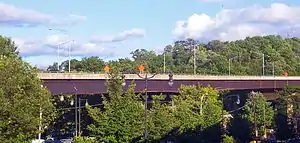John T. Loughran Bridge | |
|---|---|
 Bridge seen from Broadway in Kingston | |
| Coordinates | 41°55′06″N 73°58′51″W / 41.91833°N 73.98083°W |
| Carries | Four lanes of |
| Crosses | Rondout Creek |
| Locale | Kingston-Port Ewen, New York |
| Maintained by | New York State Department of Transportation |
| ID number | 000000001069749 |
| Characteristics | |
| Design | Steel continuous girder bridge |
| Width | 22 m (73 ft)[1] |
| Longest span | 973 feet (295 m)[1] |
| Load limit | 75.5 tons (68.6 tonnes)[1] |
| Clearance below | 56 feet (17 m)[1] |
| History | |
| Construction start | 1977 |
| Construction end | 1979 |
| Opened | 1979 |
| Statistics | |
| Daily traffic | 15056[1] |
| Location | |
The John T. Loughran Bridge carries U.S. Route 9W (US 9W) over Rondout Creek between Kingston and Port Ewen, New York, United States. It also crosses over Ferry Street on the Kingston side. It is located just downriver from the historic Kingston-Port Ewen Suspension Bridge, which carried 9W until the Loughran Bridge was constructed. It is just upriver from where the Rondout empties into the Hudson River.
It is a continuous girder bridge with four spans, totalling 973 feet (297 m) in length. In 1979, upon its opening, it was dedicated and named for John T. Loughran, a Kingston native whose judicial career was capped by his service as chief judge of the New York Court of Appeals, the state's highest judicial position, from 1945 until his death in 1953.
Its construction required the demolition of a few blocks of the West Strand neighborhood on the north side. This rallied preservationists to get the decaying area, once Kingston's waterfront in the days of the Delaware and Hudson Canal, designated a historic district. It was later listed on the National Register of Historic Places. Today many of the buildings have been renovated and the area is a popular destination for visitors to the city.